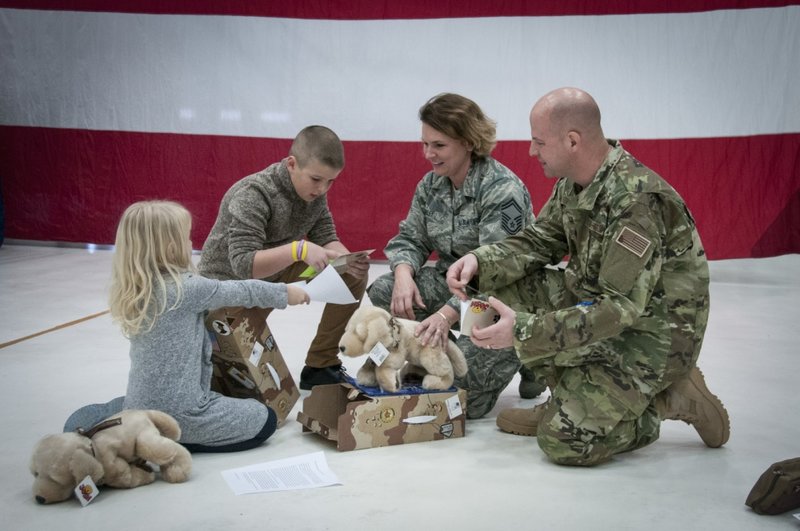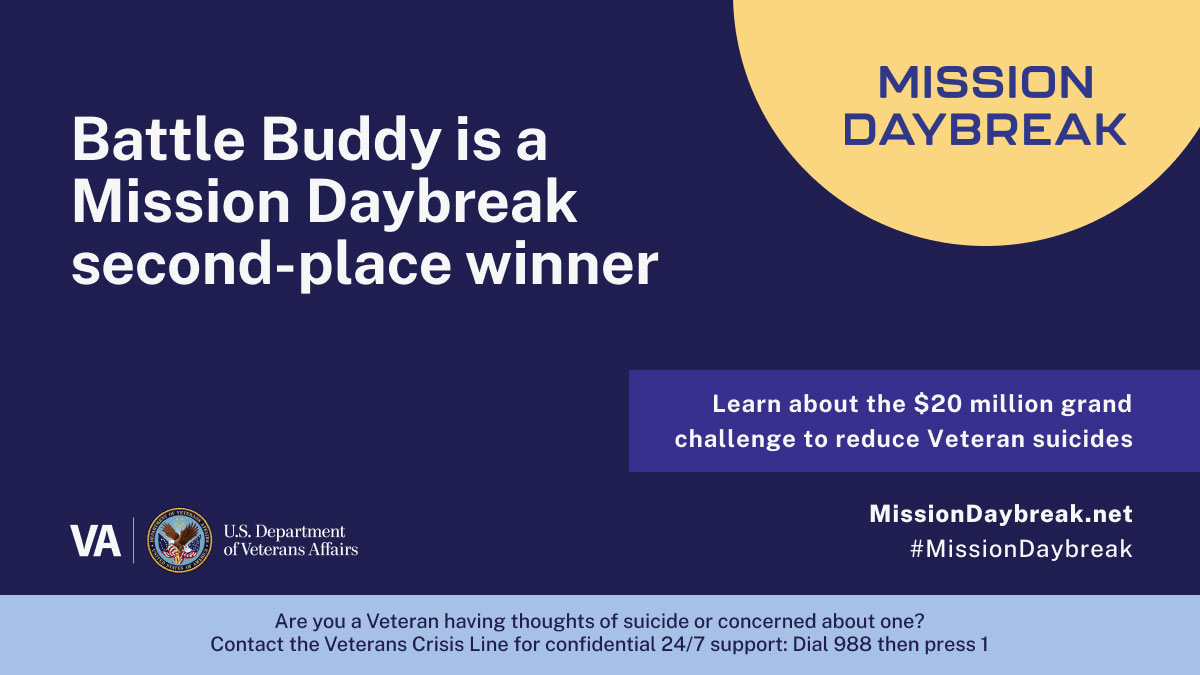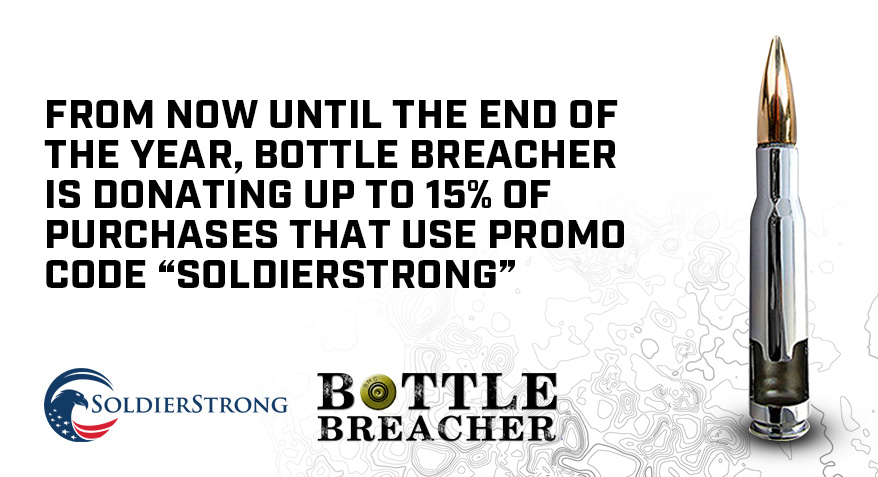The Department of Veterans Affairs announced last month the 10 winners of Mission Daybreak, a $20 million grand challenge aimed at developing innovations to reduce suicides in the veteran and military-connected population.
Veteran Leadership Program Scholar organizations win VA’s Mission Daybreak grand challenge
Mission Daybreak announces 10 winners in suicide prevention grand challenge
VA today announced the 10 winners of Mission Daybreak, a $20 million grand challenge to reduce Veteran suicide. Mission Daybreak is part of VA’s 10-year strategy to end Veteran suicide through a comprehensive, public health approach.
VA launched the multiphase challenge in May 2022, receiving more than 1,300 concept submissions in Phase 1 from Veterans, Veteran Service Organizations, community-based organizations, health tech companies, startups and universities.
“Our Veterans need and deserve suicide prevention solutions that meet them where they are, rather than taking a one-size-fits-all approach, and that’s exactly what Mission Daybreak has delivered,” said VA Under Secretary for Health Shereef Elnahal, M.D. “By drawing on a range of focus areas and life experiences, the Mission Daybreak winners have developed innovations that will save Veterans lives—and there’s nothing more important than that.”
Winners awarded for their innovative suicide prevention solutions
The multidisciplinary judging panel—representing a diversity of perspectives, from Veterans and clinicians to social workers and technical experts—evaluated submissions from the 30 finalists in Phase 2. The panel recommended the 10 winners based on the official evaluation criteria.
The two first-place winners will each receive $3 million:
- Stop Soldier Suicide’s “Black Box Project” is a technology solution that identifies and analyzes data from digital devices of Veterans who died by suicide to develop machine learning models that can identify never-before-known risk patterns. Paired with evidence-based, suicide-specific intervention services, the Black Box Project will accelerate precision methodologies in suicide prevention for the Veteran community.
- Televeda’s “Project Hózhó” is the first mental health app and comprehensive operational plan for American Indian and Alaska Native (AIAN) populations. Televeda designed the tool in partnership with AIAN and Veteran communities for Navajo Veterans with plans to adapt and expand for use with other tribes. The solution incorporates traditional healing practices like storytelling and talking-circle interventions to reduce Veteran suicide and improve access to VA resources.
The three second-place winners will each receive $1 million:
- ReflexAI is an artificial intelligence (AI)-powered tool that can help the Veterans Crisis Line train and maintain a team of responders that can meet the needs of every Veteran who reaches out. The tool utilizes a three-pronged approach of simulation, feedback, and quality assurance, which is nationally recognized as an innovative and responsible use of AI in crisis services.
- Sentinel is a mobile app designed to reduce Veteran suicide by encouraging safe storage of firearms. The application integrates smart firearm and medication locking devices with a Veteran-specific learning and community support network that facilitates strong connections with other Veterans, family and friends.
- Battle Buddy is a virtual human-led mental health and wellness application that promotes resiliency among Veterans at risk for suicide. The application’s interactive, conversational AI utilizes content from VA’s Suicide Safety Planning program during brief daily check-ins with Veterans. The mobile application will also connect with wearable sensors to leverage sleep, exercise, and other health signals. Battle Buddy is a partnership between the USC Institute for Creative Technologies and the SoldierStrong Foundation.
The five third-place winners will each receive $500,000:
- Even Health’s “Cabana®” is a virtual reality-based group support platform for Veterans who have survived a suicide attempt. The solution adapts an established support group model shown to reduce suicide and associated factors as well as increase resilience and a sense of belonging.
- NeuroFlow is a two-sided technology platform that offers Veterans tailored resources and digital care 24/7 while measuring their evolving behavioral health needs to inform care teams of potential crises before they happen. Providing virtual and in-person support for Veterans who would typically fall through the cracks, NeuroFlow assesses and triages Veterans and caregivers to get them to the right level of behavioral health care and community services based on their available benefits, geography and clinical presentation.
- Overwatch Project is a peer-based intervention program that empowers Veterans to intervene with at-risk buddies, offering to temporarily hold onto their guns or take protective storage measures before it is too late. This comprehensive program includes training, community engagement and communications initiatives crafted in a direct, authentic Veteran voice. The Overwatch Project, an initiative of the 501(c)(3) nonprofit FORGE, aims to transform the conversation about firearms and suicide prevention through an approach modeled after the “Friends Don’t Let Friends Drive Drunk” campaign.
- OxfordVR’s “gameChange,” a digital therapeutic with the Food and Drug Administration’s Breakthrough Device designation, treats severe social isolation, which is a precursor to suicidal thoughts and behavior, and is common to PTSD, psychosis and severe depression. Through virtual reality, gameChange offers an immersive and scalable opportunity to treat Veterans where they are before a crisis moment.
- Team Guidehouse’s data platform integrates social determinants of health and social media data into the health record and an external dashboard to identify Veterans at risk in real time; it also provides actionable insights for suicide prevention. Team Guidehouse is a partnership between Red Hat and Philip Held, Ph.D., Rush University Medical Center.
Following Mission Daybreak, VA may engage with select solutions through contracts, Cooperative Research and Development Agreements (CRADAs), or other partnership vehicles.
Using open innovation to foster solutions capable of preventing suicide on a large scale
Open innovation challenges like Mission Daybreak can accelerate the development of solutions to some of the world’s most pressing problems. By providing no-strings-attached financial and non-financial incentives, facilitating partnerships and mentorship, and even helping to secure commercial commitments, open innovation can shepherd and speed novel ideas to become viable prototypes. The finalists participated in a virtual accelerator program designed to help them develop ambitious but achievable roadmaps for prototyping, iteration, testing and evaluation.
To learn more, visit missiondaybreak.net.
SoldierStrong Named A Winner in VA’s $20 Million Mission Daybreak
SoldierStrong has been named a winner in Mission Daybreak, a $20 million U.S. Department of Veterans Affairs grand challenge to reduce Veteran suicides. In Mission Daybreak, SoldierStrong partnered with the University of Southern California’s Institute for Creative Technologies as part of team Battle Buddy. As a second place winner, Battle Buddy will receive $1 million.
SoldierStrong and USC-ICT were recognized for their efforts to advance the use of technology to prevent suicide through Battle Buddy, a virtual human-led mobile mental health and wellness application. This interactive, embodied conversational agent leverages content related to the VA’s Safety Planning program embedded within brief daily check-ins with veterans. The Virtual Human will also allow veterans to opt-in to connect their wearable sensors to the app, leveraging sleep, exercise, vocal analytics and other sensed signals to their overall well-being.
Following Phase 1, 30 challenge finalists each received $250,000 and advanced to the Phase 2 virtual accelerator program, which helped them develop ambitious but achievable roadmaps for prototyping, iteration, testing, and evaluation. Technology partners supporting the accelerator included Amazon and Microsoft. In November 2022, finalists had the opportunity to speak about their solutions with challenge judges and representatives from VA, VSOs, Capitol Hill, and policy institutes at Demo Day, held at the Samsung Executive Briefing Center in Washington, D.C.
The multidisciplinary judging panel — representing a diversity of perspectives, from Veterans and clinicians to social workers and technical experts — evaluated submissions from the 30 finalists in Phase 2. The panel recommended the 10 winners based on the official evaluation criteria.
Following Mission Daybreak, VA may engage with select solutions through contracts, Cooperative Research and Development Agreements (CRADAs), or other partnership vehicles.
Visit MissionDaybreak.net for more information on the challenge.
Stepping into 2023
SoldierStrong Forges Partnership with Patriot-Owned Business, Bottle Breacher, to Benefit Veterans Experiencing Post-Traumatic Stress
SoldierStrong is honored to announce a partnership with the Tucson, Ariz., manufacturer Bottle Breacher to provide critical state-of-the-art technology to treat veterans experiencing post-traumatic stress.
Money raised through the effort will fund SoldierStrong’s efforts to donate BraveMind virtual reality software and hardware systems to Veterans Affairs medical centers. Chris Meek, who co-founded SoldierStrong after his experiences at Ground Zero on Sept. 11, 2001, said it costs $15,000 to place the BraveMind program at a single VA hospital.
“Five VA hospitals have expressed an immediate need for the technology. We owe it to our nation’s heroes to ensure the VA can provide critical mental health treatment to those who have defended our freedom,” Meek said.
The Bravemind system, developed by the University of Southern California’s Institute for Creative Technologies, delivers prolonged exposure therapy. This evidence-based treatment method allows therapists to recreate the scene of the veteran’s troubling memory in a virtual reality headset. It safely enables the veteran to relive and deconstruct that memory with the aid of a licensed therapist to better cope with the trauma it created.
Bottle Breacher owners Amber and Mike Wall said their 20 years working in the corporate world fueled their desire to own their own business and to help America’s veterans. “We understand what it takes to produce meaningful results, and why it’s important to support nonprofits that do the same thing. SoldierStrong produces results and changes lives with every donation,” Amber Wall said. “Those are just two reasons why we’re passionate about SoldierStrong’s BraveMind program, which helps veterans living with PTS.”
Mike Wall said their company, which specializes in .50 caliber shell bottle openers in a variety of finishes, colors and themes handcrafted by veterans, is partnering with SoldierStrong through the end of the year to donate up to 15 percent of all purchases through their website, bottlebreacher.com, that use the promo code “SoldierStrong.”
Meek praised the Walls’ commitment to employing veterans and their desire to give back to America’s servicemen and women. “SoldierStrong is enthusiastic about partnering with and supporting veteran-focused businesses,” he said. “The Walls and Bottle Breacher are having a positive impact not just on the veterans they employ and American manufacturing, but also on the community of military veterans all across the country. The same integrity and dedication that its people devote to their work will make a difference in the lives of veterans recovering from the debilitating effects of post-traumatic stress. It’s a true honor to have the support of and partnership with Bottle Breacher to benefit the lives and mental health of our veterans.”
To date, SoldierStrong has donated 24 BraveMind systems and other state-of-the-art medical technologies valued at more than $5.2 million to medical facilities across the country. The nonprofit’s goal is to make the BraveMind technology available to veterans in all 50 states.
Military Families: The Power of Maintaining Balance and Creating New Traditions During the Uncertainty of the Holiday Season

Military Families: The Power of Maintaining Balance and Creating New Traditions During the Uncertainty of the Holiday Season
By Chris Meek
For many, the holiday season is synonymous with laughter, cheer and good tidings, large celebrations and social obligations with family and friends. But for some service members, veterans and their family members, extra anxiety prompted by the holidays’ social activities can escalate stress and sink them into depression and thoughts of suicide as they cope with the effects of a debilitating physical injury or post-traumatic stress (PTS).
Only recently has the focus shifted to the experiences and challenges of military dependents, who make their own, unique sacrifices when a parent or parents serve. For Isabella Taft, holidays while her father, Ward, was on active duty sometimes meant navigating his reintegration into the family dynamic when he returned home from long deployments. Her mother, Amy, acknowledged that process was “one of the toughest aspects of military life.”
“You do eventually get over the initial shock of your loved one leaving, and learn to make your own individual patterns and habits,” Amy said. “Around this time of year, you just keep rolling because you’re not going to let an entire holiday be ruined because they aren’t there. But you question, do you involve them in the holiday plans, just in case, or not? Will they be there or not? How do you create normalcy and routine with that revolving door?”
Holidays became even more challenging after Ward received multiple blast injuries, including a moderate brain injury. With a severely damaged frontal lobe, the U.S. Navy corpsman, who spent the majority of his career serving with Marine units, experienced severe mood swings, suffered short-term memory loss that made it impossible for him to drive, and lost fine motor skills that left him unable to tie his own shoes.
Pre-injury, the Taft family might travel up to 10 hours by car to visit with friends and family, often in large gatherings and unfamiliar settings. Post-injury, family and friends had to come to terms with their decision to no longer travel because travel sparked Ward’s migraines and overstimulated brain activity while the stress of the unfamiliar settings could exacerbate his PTS.
With time, Isabella and Amy found several ways to navigate the stress of the holidays while prioritizing Ward’s recovery and specific needs. Setting boundaries was an important step in creating holiday plans that fit the Tafts’ needs. The process required them to pinpoint specific difficulties tied to family gatherings and identify the steps to overcome them.
Gently explaining to family and friends what was required of them was imperative. If they wanted to see the Tafts for Christmas, they’d need to make the commitment to come to the Taft home. Ward would be involved as much as possible in holiday activities but there inevitably would be times when he would need to separate from the group.
“That meant the family would need to accept that this didn’t mean that something was wrong. It didn’t mean that everyone else needed to stop what they were doing,” Amy said. “They just needed to respect that Ward needed space.”
These conversations created structured holidays that, though different, created a level of control that was beneficial to the entire family, but especially for Ward. For Isabella, opening up to friends was another step.
“Growing up I never wanted to have friends over, I didn’t want holidays or birthday parties, sleepovers or movie nights because I didn’t know how my dad would react. The last thing I wanted was for my dad to walk out and scream at me. You don’t want to be seen as different from your peers,” Isabella said.
Over the years, she has recognized how powerful it was to share with friends about her father’s brain injury and how it has affected her family. She has been touched by their understanding and offers of support. According to Isabella, a result of that honesty was a “house filled with laughter again after 10 years,” a feeling which she described as “awesome.”
Maintaining balance and creating new traditions also proved invaluable.
While growing up, Isabella recognized that her younger sister, Clara, needed to continue to experience traditions of old while simultaneously making new traditions. In order to keep the old traditions, Isabella ensured that things normally done with the whole family were now shared between the two sisters, as Amy’s attention was understandably turned toward taking care of Ward during his recovery from injuries that also included broken bones and nerve damage. Isabella and Clara also took responsibility for picking up Christmas presents for Amy, as Ward’s memory loss made it likely that he might forget.
Traditions that otherwise could have fallen by the wayside during a time of great stress instead gave way to new, special traditions or a blend of new and old. Such adaptability kept the spirit of the holiday alive for the sisters while allowing them to adjust to their family’s specific circumstances. What could have been a reason to abandon tradition altogether became a reason to create new ones while cherishing the old.



